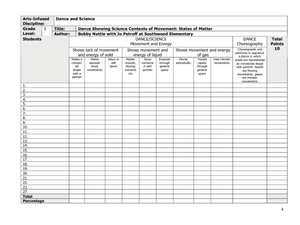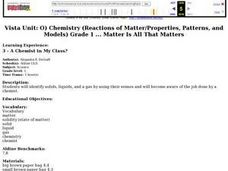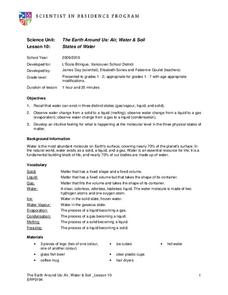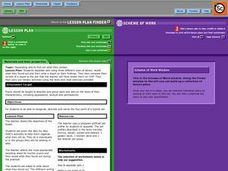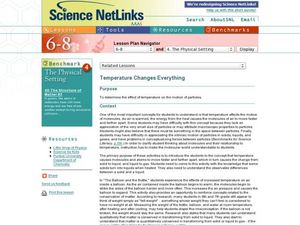University of Waikato
Water Molecules in Drama
The state of molecules is changing. Young actors and actresses perform the process of phase change in front of the class. They assume the roles of water molecules and, as a group, show how the behavior of the molecules in the solid,...
Curated OER
Dance Showing Science Contexts of Movement: States of Matter
Fifth graders dance in different ways to show movement of states of matter. In this matter lesson plan, 5th graders make connected shapes with a partner, make flowing movements, travel rapidly, and more.
Curated OER
A Chemist in My Class?
First graders in kindergarten science class discuss matter. They make predictions and then identify mystery items in brown paper bags as either solid, liquid, or gas by using their senses. They discuss that a chemist is a scientist that...
Curated OER
Properties of Liquids
Students describe properties of liquids and use descriptive language as a springboard to develop precise vocabulary for properties of liquids. They also use vocabulary as practiced with liquid-vocabulary card games. Finally, students...
Curated OER
Science: Identifying Properties of Matter
Students observe a demonstration of the the three forms of matter - air, water, and solids - in plastic bags. After discussing the properties, they transfer them to a Venn diagram. Finally, students identify five items in the classroom...
Curated OER
States of Water
Young scholars investigate the 3 states of matter. In this physical science "matter" lesson, students observe and participate in a number of demonstrations involving melting and freezing water. Young scholars observe the effect heat has...
American Chemical Society
Air, It's Really There
Love is in the air? Wrong — nitrogen, oxygen, and carbon dioxide are in the air. The final lesson in the series of five covers the impact of temperature on gases. Scholars view a demonstration of gas as a type of matter before performing...
Santa Monica College
The Density of Liquids and Solids
There are underwater rivers that flow on the ocean floor thanks to a difference in density. Scholars learn about the density in both liquids and solids in the second activity of an 11-part series. They then determine the density of...
Mr. E. Science
Changes in Matter
Do solids, liquids, and gases even matter? The presentation focuses on changes in matter, including phases, Boyle's Law, Charles' Law, and physical changes.
Curated OER
Three States of Matter
Third graders investigate the three states of matter and the properties of materials as they undergo physical changes. They identify examples of each type of matter, role-play atoms in solids, liquids, and gases, and conduct an...
Curated OER
What's the Matter?
Students explore matter. In this matter and technology lesson, students locate examples of solids, liquids, and gases inside and outside the classroom, and record their findings in a graphic organizer. Students listen to the...
Curated OER
States of Matter
Fourth graders define the term matter. They compare properties of solids, liquids, and gases. They describe how matter changes from one state to another. They classify objects as either solid, liquid, or gas.
Curated OER
Science- Unit on Matter- Liquids-
Second graders discover that everything is made of matter. they determine the properties of liquids and that like solids, liquids can be grouped or classified according to properties or qualities. they assess that solids have a definite...
Curated OER
Materials And Their Properties
Seventh graders investigate the particulate level of solids, liquids, and gases. They examine how the particle method show the interplay between scientific theories and evidence.
Curated OER
It's The States of Matter
Students investigate the properties of solids, liquids and gases. In this states of matter lesson plan, students observe dry ice and its characteristics. They calculate the density of dry ice and observe the sublimation of the dry ice...
Curated OER
Funny Putty
Students are introduced to the properties of solids, liquids and gases. They see that colloids are mixtures which display the properties of more than one of these states. They engage in an excellent experiment which demonstrates this fact.
Curated OER
The Physical Behavior of Matter
Young scholars distinguish between three phases of matter: solid, liquid and gas, on the molecular level. They compare and predict the relative compressibility of the three phases of matter through journal writings and drawings.
Curated OER
States of Matter Summary
In this states of matter worksheet, students are given a summary of the particle arrangement, the motion of particles, the properties of particles and models of particles in solids, liquids, and gases. Melting, evaporating and boiling,...
Curated OER
States of Matter
In this states of matter worksheet, students will brainstorm and write down facts about solids, liquids, and gases in a graphic organizer.
Curated OER
Temperature Changes Everything
Learners determine the effect of temperature on the motion of particles. They study the difference between particles in a gas, liquid, and a solid and see how the characteristics of solids, liquids, and gases can be explained by particle...
Curated OER
A-Mazing Matter
A fun worksheet with an unusual activity. Here, your students color-code the squares of liquids, solids, and gasses to discover the path in the maze for the robot rat to get to the cheese. Students color twenty-seven squares to draw the...
Curated OER
How a Liquid Changes to a Gas
Second graders identify three forms of matter- solids, liquids, and gases with 100% accuracy. They observe water evaporating from an open container and water evaporating and condensing in a closed container. The students assess that a...
Curated OER
States of Matter
In this states of matter worksheet, students are given 15 statements and they fill in the blank with terms related to solids, liquids and gases and the transition from one state to another. Students use the clues to complete a crossword...
Curated OER
Matter and Energy
In this matter and energy worksheet, students identify substances as solids, liquids or gases, they use the kinetic theory to describe the motion of particles and they explain the conservation of mass and energy when a substance changes...



